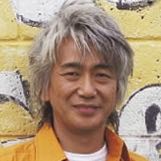Yōsui Inoue (井上 陽水, Inoue Yōsui, born August 30, 1948) is a Japanese singer, lyricist, composer, guitarist and record producer, who is an important figure in Japanese music. He is renowned for his unique tone, eccentric lyrics, and dark sunglasses which he always wears.
Under the stage name Andre Candre, Inoue debuted in 1969 and released a single "Candre Mandre" by CBS Sony Records. After he changed his stage name and signed onto Polydor, he recorded his first studio album Danzetsu in 1971, and the album was acclaimed by critics. Inoue gained recognition as a folk-rock singer-songwriter through his 1973 Kōri no Sekai album, which became the first long-playing record that sold more than a million copies in Japan alone. His early work has been compared with the music of Paul McCartney and Roy Orbison. Mark Anderson writes in the Encyclopedia of Contemporary Japanese Culture, "His music was smart, melancholy and melodic. [...] Inoue's work of the early 1970s [...] is widely thought to have been a significant influence on the development of Japanese pop rock".
Inoue has released 22 solo studio albums, and also produced 2 albums with Tamio Okuda. He has been one of the most commercially successful Japanese male solo recording artists of the last 40 years, selling in excess of 10.9 million copies on the country's Oricon albums chart up to May 2009 and has had seven number-one albums; Kori no Sekai, Nishoku no Koma, Good Pages, Shoutaijou no Nai Show, 9.5 Carats, Under the Sun, and the compilation Golden Best which was released in 1999 and has shipped over 2 million units.

































